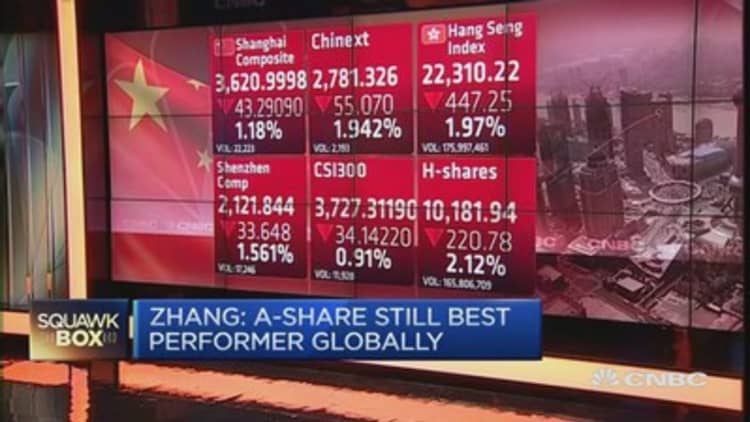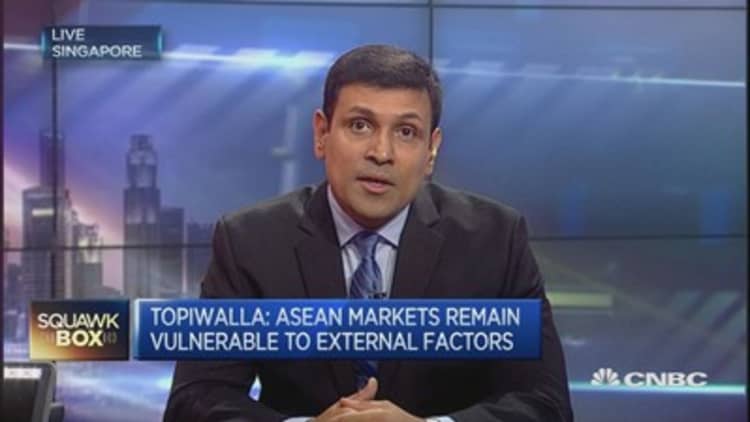Asian equities slid deeper into negative territory on Friday, joining a global sell-off sparked by jitters concerning the world's second-largest economy.
In particular, fresh data released earlier in the session exacerbated these worries, after the flash Caixin/Markit China Manufacturing Purchasing Managers' Index (PMI) dropped to 47.1 in August, marking a six-and-a-half-year low. The reading beat a Reuters poll of 47.7, but was lower than July's final reading of 47.8.
Meanwhile, Wall Street was hammered overnight, with the S&P 500 erasing gains for the year and ending at a more-than-six-month low. The and the Nasdaq Composite plunged 2.06 and 2.82 percent, respectively, as investors weighed continued uncertainty about the timing of a rate hike and global growth concerns led by China.
Mainland markets down
China's benchmark Shanghai Composite closed down 4.2 percent in yet another rollercoaster session, with the dismal factory growth figures "adding salt to the wound" of a market already reeling from worries regarding the economy and the recent depreciation of the yuan.
Earlier in the session, the benchmark index fell as much as 4.7 percent to hit an intra-day low of 3,490.5 points. According to IG market strategist Bernard Aw, the quick rebound from the intra-day low signified that authorities are keen to "protect the 3500 level, though the question will be how long the authorities are willing to defend it, especially if the global equity markets retreat further."
Brokerage firms such as Huatai Securities, China Merchants Securities and Founder Securities made it to the top losers list, down more than 8 percent each.
Read MoreYuan bearish bets at 5-year high: Reuters poll
Among China's other indexes, the benchmark CSI300 index - which consists of 300 A-share stocks listed on the Shanghai and Shenzhen stock exchanges - closed down 4.6percent, while the smaller Shenzhen Composite tanked 5.4 percent.
In Hong Kong, the Hang Seng index fell 1.5 percent to its lowest level since May 2014.
Among companies releasing earnings results, blue-chip Swire Pacific tanked 1.2 percent despite reporting a 23 percent rise in first-half net profit. By contrast, Li & Fung advanced 3.5 percent on the back of a 33 percent jump in first-half profit.

Nikkei slumps 3%
Japan's fell below the key 20,000 level after chalking up a four-day losing streak.
Financials and export-oriented counters were among the hardest-hit; Mitsubishi UFJ Financial Group and Sumitomo Mitsui Financial Group eased more than 4 percent each, while Mizuho Financial lost 3.3 percent.
Among the blue-chip exporters, Sony and Toshiba sank more than 4 percent each, as the yen strengthened against the dollar.
Meanwhile, shares of Apple suppliers tracked the 2 percent decline in the iPhone maker overnight, with electronics parts makers Alps Electric and Nidec closing down 7.1 and 4.9 percent, respectively. Apple shares were hurt by a report by Gartner which showed slowing smartphone sales in China.
Read MoreJapan cautions China against frequent yuan manipulation
ASX loses 1.4%
Australia's S&P ASX 200 index widened losses to finish at an eight-month low, following China's weak factory data.
Banks were among the biggest decliners for the day, with Australia and New Zealand Banking, Westpac and Commonwealth Bank of Australia down nearly 3 percent each.
Gold producers helped to offset losses, with Kingsgate Consolidated soaring 10.7 percent as spot gold hits its highest level in more than a month in Asian trade. Alacer Gold piled on 6.7 percent, while Newcrest Mining and Evolution Mining tacked on 4.6 and 3.4 percent, respectively.
On the corporate news front, Insurance Australia Group (IAG) tanked 5.2 percent after posting a 41 percent drop in full-year net profit. By contrast, shares of health insurer Medibank outperformed with a 13 percent jump, after delivering a 13 percent rise in underlying net profit in its first year as a listed company, beating analysts' expectations.
Meanwhile, Santos shares finished 0.2 percent lower in choppy trade after the gas producer put itself up for sale. Meanwhile, current managing director and chief executive David Knox announced that he will step down as soon as his replacement is found.
Read MoreN.Korea and S.Korea have first major border clash in 5 years
Kospi skids 2%
South Korea's Kospi index turned further south in the final hour of trade to end at an seven-month trough as news of heightened tensions along the Korean Peninsula dampened already-frail investor sentiment.
"South Korean artillery reply to North Korean rocket marks tensions ratcheting up in the Korean peninsula as Kim Jong Un ordering combat readiness of troops," analysts at Mizuho Bank wrote in a note.
Heavyweight components were sold-off, contributing significant downward pressure on the bourse. Samsung Electronics and Hyundai Motor slumped 3.3 and 2 percent, respectively, while chipmaker SK Hynix lost 3.2 percent.
According to Reuters, losers outnumbered gainers by 8.9 to 1 and all sub-indices ended in negative territory.

Rest of Asia
Bourses in the rest of Asia declined, with the exception of Malaysia's FTSE Bursa Malaysia KLCI index which pared losses to edge up 0.2 percent in the afternoon trading session.
Taiwan's weighted index closed down 3 percent at its lowest level in over 2 years, led down by tech shares such as Catcher Technology which tumbled 7.5 percent.
Singapore's Straits Times index fell through the key psychological level of 3,000 points, as panic selling among investors led the bourse down 1.6 percent.
Thailand's SET index eased 0.8 percent as foreign outflows look set to continue for the fourth straight day following the deadly bomb blast in central Bangkok earlier this week. According to Reuters, the net foreign selling has come up to 4.7 billion baht ($131.9 million) thus far.
In India, the BSE Sensex index plunged 1.5 percent to its lowest level since June 19, while the 50-share Nifty index slipped below its psychological level of 8,250, tracking the sluggishness across global markets.

